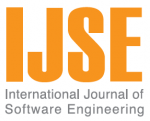Vol 6 No.2
Papers
ABSTRACT Performance is a persistent quality of any software systems. Software performance engineering (SPE) encompasses efforts to describe and improve performance of systems at the early stages of development of the system. Multi-Agent Systems (MAS) are composed of autonomous entities called agents which cooperates together to solve complex distributed problems. Whatever complex the system, the quality of the system is an important parameter to be addressed. In this paper we are proposing an algorithm for predicting the performance of softwfrfare systems using Artificial Neural Network (ANN) approach. The algorithm is a new attempt in performance engineering of MAS. We have used ANN models for size estimation of the software (representative workload) which is an important parameter for assessing the performance in early stages of software development. Another significant contribution is assessment of performance by considering the data gathered during feasibility study. The ANN models are trained and validated for different data sets. The algorithm is validated for static properties of the RETSINA architecture. A case study on MAS is considered and the results are obtained using the validated ANN model.
ABSTRACT Service Oriented Software Engineering (SOSE) is an emerging field for developing software using web services. One of the main tasks of a Requirement Engineer in SOSE is matchmaking between requirements and available services. Published literature indicates that Requirements Engineering (RE) in SOSE is facing different challenges. In this study, we report the results of an online survey conducted with practitioners and the researchers working on service oriented projects. The aim is to get an insight about the issues and challenges faced in SOSE during requirements engineering. The results show an interesting pattern of how the researchers and practitioners have differing views on reported challenges. The difference in opinion is mostly because SOSE is a new field and most of its concepts are not fully understood and appreciated by designers and developers, resulting in a poor implementation of the SOSE concepts.
ABSTRACT Test case prioritization techniques improve the cost-effectiveness of regression testing and provide several benefits such as earlier detection of faults and earlier feedback to testers. This paper provides an overview of existing research in the area of test case prioritization and reviews 70 journal articles and conference papers. We show the state of the research and a new classification schema for test case prioritization techniques. Existing research is discussed with respect to the test case prioritization approaches and the performance evaluation parameter criteria used in the studies.
ABSTRACT Software security estimation is the valuable technique of understanding for improving, guiding and controlling security integration at design phase. It is required to assess performance and degree of protection using security attributes including confidentiality, integrity and availability. The assessment of security using model is more appropriate and its validation signifies the valid impact. The security quantification model is developed by multiple regression technique using design complexity as a key factor. The applied statistical analysis on this study concludes its statistical significance.
ABSTRACT Agile practitioners have expressed concern over their inability to correctly estimate costs associated with Agile web software development. This concern has become even more critical as costs associated with development continue to increase. As a result, significant research attention is now intended for gaining a better understanding of the web based projects in context with Agile software-development process as well as constructing and evaluating calibrated software cost estimating tools. This paper discussed the necessity for new metrics and model to fast predict the size, effort and duration for agile based web development projects. The method called web estimation using COCOMOII for Agile methods AGILEMOW, addresses a need to get effort estimation in a limited period using limited information. In contrast with other existing methods, AGILEMOW uses agile characteristics, raw historical information about development capability and high granularity knowledge about the web system to be developed. This research focuses on development of effort estimation model for agile web projects. Creation and use of the model is enlightened in detail. The model was calibrated using the empirical data collected from seven completed web projects. The experimental results prove that model has good estimation accuracy in terms of effort and MMRE. The suggested method/model is simple and particularly appropriate for small or medium size web based systems developed by making use of agile methodologies.
